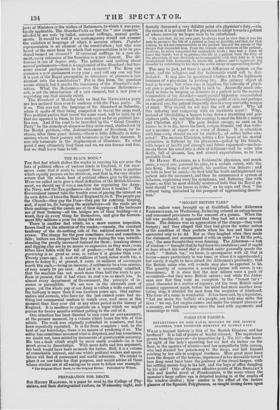"HONEST BRITISH TARS."
FOUR sailors were brought up at Guildhall, before Alderman FAREBROTHER, on Wednesday, for having entered an eating-house and consumed provisions to the amount of a guinea. When the bill was produced, it appeared that they had not a sous among them. The defence was an aggravation of the charge—they were hungry; and they alleged that they had given the waiter notice of the condition of their pockets when his loss and their gain amounted only to 6s. 2d. But as they laughed when they made the statement, and accompanied it with an order "to fill the pots, boy," the man thought they were filming. The Alderman—a tun of wisdom—" thought that,he had been too credulous ; and it ought to have struck his mind that a British sailor generally speaks the truth." "British tar," we know, is synonymous with all that is heroic—more particularly in war time, or when it is apprehended ; but surely it ought to have struck the Alderman's profundity, that the British sailor who will swindle may also be expected to lie. The quantity of nonsense a sounding phrase will cover, is ex- traordinary. It is clear that the four fellows were a pack of scoundrels—but they were British sailors ; and while the Alder- man saw that they were an exception to the "honest tar's" good character in a matter of roguery, yet the term British sailor coming uppermost again, before his mind had made another hesi- tating step, it shielded the men from the suspicion of falsehood. The force of a name is wonderful. It has been said, by a legislator, "Let me _make the ballads of a people, any body may make the laws :" we say, Let us give names and make the current phrases of a country, and logicians may cover the land with arguments and reasonings in vain.


























 Previous page
Previous page